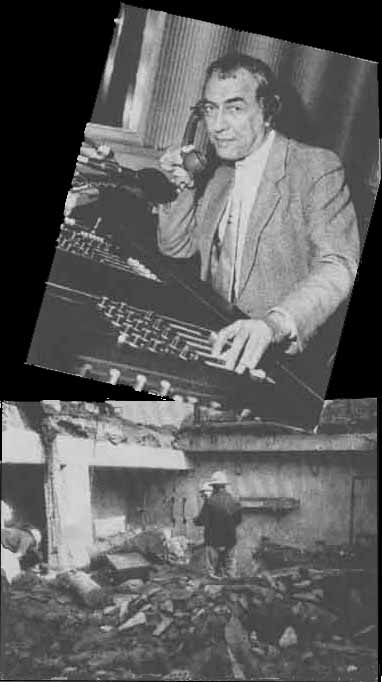| The appalling tragedy which devastated the village of St.Michael`s-on-Wyre on a sunlit evening in May 1984 provided the greatest challenge ever to the newsroom and presenters of Red Rose Radio Wednesday, 23rd May was a pleasant, sunny evening,ideal for a trip out to Abbeystead water pumping station by a party of villagers from St.Michaels. Abbeystead is set in beautiful countryside between St. Michael`s and Lancaster, and the pumping station was landscaped to blend picturesquely into the scenery. The people from the village, councillors, teachers, tradespeople, business and industrial executives, many with families, were to tour the pumping station by arrangement with the Northwest Water Authority. The visit had grown out of discussions between the parish council and the water authority over the best way to prevent a recurrence of the Wyre floods which two years earlier had ravaged St.Michael`s.While a cheerful, laughing coach party gathered at the coach on the pub car park in the centre of St. Michael`s, Red Rose Radio`s news editor Mike Henfield took his staff for an evening`s tennis in a local park. Head of Programmes Keith Macklin went to the house of a friend for an evening`s supper and conversation. Within an hour fate was to throw them all together in an evening of heart-rending tragedy. Sometime between 6.30 and 7.30pm, while the St.Michael`s party was in an underground passage at Abbeystead, there was an explosion which filled the whole chamber with flames. Nine people died as a result of the first blast, many others recieved frightful burns and injuries, and the final death toll reached 16. A constant shuttle of ambulances ferried the dead and injured to hospitals in Lancaster, Preston, Manchester and Whiston, near Liverpool nd some survivors were to stay in hospitals for months recovering from fearful injuries. On the return of the newsroom staff from their games of tennis, Mike Henfield heard the first news of the disaster from telephone calls from firemen and ambulance workers, who reported an explosion and fire,but had few precise details. | Bottom: The remains of the pumping station.  Immediately, reporter Judith Burns was dispatched to Abbeystead. Michael Green went to the Royal Preston Hospital and Richard Foster to Lancaster Royal Infirmary. Henfield himself, with Chris Rider, collated the news as it came in, and Henfield gave the news to the world through ITN and Independant Radio News`national and International outlets. Macklin, quietly absorbing a sandwich and a cup of tea at his friends house, heard the bulletin, shot out of his chair, and drove to St. Michael`s, the stricken village from where the Abbeystead party had set off on the ill-fated trip. As the evening wore on, harrowingly, it rapidly became apparent that here was a disaster on a major scale. The initial story of an explosion with a few casualties was overtaken by distressing accounts of a massive blast, at least nine fatalities, and dozens of badly burned and injured victims lying in intensive care units in several hospitals. Red Rose Radio normally closes down with Sally Moon at 2am. On 23rd May it remained open throughout the night, with reporters at all points sending reports from the scene of the explosion, from St.Michael`s, where the villagers anxiously waited for news, from the hospitals and from the emergency services. |
|
| Sally stayed at the microphone until 5am, then Nick Risby came in to start his morning show an hour early. At 7am and 8am Macklin and Henfield collated reports, interviews and telephone messages into two graphic half-hour accounts of the disaster. The news coverage continued throughout the day as the tragic death toll increased, and the water authority, police, ambulance and fire authorities attempted to piece together the causes of the explosion. The Red Rose overnight news team remained on duty continuously, with only snatched breaks for a cup of coffee and a hastily eaten sandwich, for 24 hours until the Thursday evening 5pm Red Rose Reports one-hour news magazine.Their efforts did not go unnoticed. A letter from the Independant Broadcasting Authority Regional Office said:"A tragedy of this nature stretches a radio station`s resources. It would seem through this tragedy that Red Rose has been drawn even closer to the community which it serves so well." Other letters of commendation, for close cooperation, came in from Lancashire County Police,the fire and ambulance services, and from hundreds of listeners. The letters were gratefully recieved, but unnecessary. Red Rose had merely done it`s job. | ||